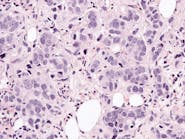Small percentage of people with early dementia eligible for new Alzheimer’s drugs
Only a small percentage of older adults who are in the early stages of Alzheimer’s disease meet the eligibility criteria to receive new monoclonal antibody treatments, drugs that target amyloid-ß plaques in the brain, an early sign of Alzheimer’s disease. The new research is published in the August 16, 2023, online issue of Neurology, the medical journal of the American Academy of Neurology. Clinical trial results for these drugs are only available in people in the early symptomatic stages of the disease, mild cognitive impairment or mild dementia due to Alzheimer’s disease.
At the time of the study, two monoclonal antibodies called lecanemab and aducanumab had received accelerated approval from the FDA. More recently, lecanemab, which has been shown to slow progression of the disease, has received traditional FDA approval.
The study included 237 people, ages 50 to 90, who had mild cognitive impairment or mild dementia, and whose brain scans showed increased amounts of amyloid-ß plaques. Researchers then looked at the eligibility criteria for clinical trials for lecanemab and aducanumab.
For lecanemab, clinical trial inclusion criteria required specific scores on a variety of thinking and memory tests, as well as a body mass index between 17 and 35. Researchers found 112 people, or 47%, would meet the inclusion criteria to participate in a clinical trial. Then researchers looked at clinical trial exclusions, factors that could make people ineligible for a trial, including multiple health factors such as stroke, cardiovascular disease, a history of cancer, or brain scan findings that showed abnormalities like old, small brain bleeds or brain injuries due to insufficient blood supply. Researchers found that after the exclusions, only 19 people, or 8%, would have been eligible for a lecanemab trial.
However, after modifying the exclusion criteria to include all participants with mild cognitive impairment and not applying the results of additional memory and thinking tests, 17% of participants with mild cognitive impairment would have been eligible for a trial.
For aducanumab, clinical trial inclusion criteria required specific scores on thinking and memory tests and that participants were ages 50 to 85. Researchers found 104 people, or 44%, would have met the characteristics required to participate in a clinical trial. After further examining who would be excluded from the trial due to multiple health factors, including stroke, cardiovascular disease, uncontrolled high blood pressure, a history of cancer or brain scan findings, researchers found that only 12 people, or just 5%, would have been eligible for an aducanumab trial.





